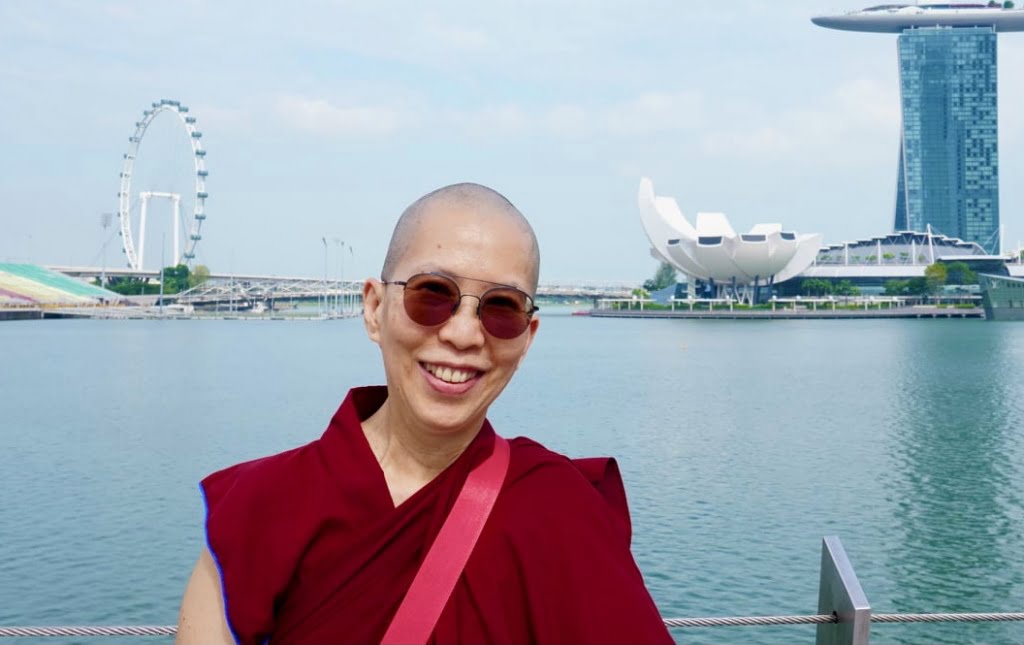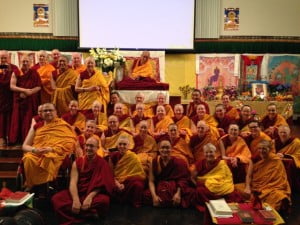My Experience as an IMI Regional Representative
By Ven Tenzin Tsultrim

I’ve been the regional representative for IMI Southeast Asia for about a year now, since being invited to take on the role in February 2021. The workings of IMI were not unfamiliar to me as I had once served on the Board from 2009 to 2011. I remember just a few months after receiving ordination in 2009, an email arrived from Ven. Roger saying that Lama Zopa Rinpoche had checked and mine was among some names that had come out suitable to join the Board, so I took the advice. Back then, we had our meetings on Skype.
Wind the clock forward to 2021 to the current global pandemic. Here in Singapore where I live, I have adjusted to partial lockdowns and to not travelling outside the country. I had been used to living at least a month or more every year abroad, mostly in India and Nepal in monasteries or FPMT communities. I do miss the group interactions with other sangha at the big retreats organized around Rinpoche’s teachings. However, soon after I came into the representative role, our IMI director Ven. Tendar quickly reminded me that it was possible to make contact with the other sangha using Zoom.
At this time the IMI members of Southeast Asia are primarily from Singapore and Malaysia. Between these two countries, there are 16 monks and nuns registered with IMI. Some are serving FPMT centers in other parts of the world while some are seldom with an FPMT community anymore. One of the jobs of the representative is to connect with all the members in the group and to remind everyone of our mutual connection to Rinpoche and the organization, and to encourage and develop that connection. The representative can also be a resource person who can help with information or attend to questions.
On the organizational level, I have been able to participate in the FPMT regional meeting for East and Southeast Asia and to get to know those who serve at fellow FPMT centers stretching from Mongolia, to Hong Kong, and to Indonesia. Thanks to our efficient FPMT regional coordinator Selina Foong, one of the key things that we were brought up to speed on at our recent online conference was the Protecting from Abuse policy.
However, it is on the level of making personal contact with several of my sangha sisters and brothers that has been the highlight of my service thus far. Through the course of the last ten months, I have become better acquainted with the Malaysian sangha, getting to know what their circumstances and needs are as they serve their own communities or attend study programs. It has been heartening to hear the stories of their commitment to others and their interest to improve in practice. One newer nun has expressed a wish to receive more training in the vows and in proper conduct. She felt that even while she had lived with a nuns’ community for over a year, she had not gained a full understanding of the rules. Our conversation allowed me to understand her needs and gave me the chance to offer solutions that I hope will help her. It could even lead to more training opportunities to be organized for new sangha in the near future, if I may share this much.
Here in Singapore, I was able to reconnect with an older nun who took full ordination some years ago, to try to find out how she was as she is hardly seen anymore at our center. Now in her seventies, she is satisfied with maintaining distance from our community. As much as I would wish to have everyone come together, the reality is that whether through choice or circumstances, paths do diverge. Perhaps at some point those paths will meet again.
To end on an inspiring note, here’s a story that emerged from a meaningful chat I recently had with another nun, originally from Malaysia. At the center where she serves are a number of nuns. One elderly nun paid a visit to the center after a long absence as she had been severely ill with cancer. This nun had been living on her own despite her illness. Completely shocked by how emaciated and sickly this nun looked, our sangha sister immediately offered her a place to stay in the center saying that they would take care of her until she was well enough to return home. At first the elderly nun refused but after some persuasion, she finally accepted. Our sangha sister offered her own room to this nun and slept in the office instead. The nun stayed at the center for three months and during this time, not only did she gradually recover, the other residents at the center changed their attitude towards her, becoming more friendly. After three months of being cared for at the center, the elderly nun was finally well enough to go home.
Our sangha sister, due to her qualities, wishes to remain anonymous. What she willingly did to help another in great need struck me all the more in these pandemic times where social distancing and self-isolation have been impressed upon us as the norms. It is greatly reassuring and inspiring to learn through our sister’s example that compassion can easily take the upper hand and wield its magic.
From my little roost here on this small Singapore island, while the pandemic has put a temporary shutdown on borders and travels, I have found that the internet has facilitated good connections among several of our regional members. The little efforts at reaching out is what makes community in spite of it all.
Tenzin Tsultrim is the current regional representative for IMI Southeast Asia. She also serves as a puja leader at Amitabha Buddhist Centre in Singapore and is a Teaching Assistant with the FPMT Basic Program taught at Jamyang Centre London. She received getsul ordination from His Holiness the Dalai Lama in 2009.

